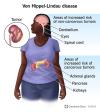
A Swedish scientist is using CRISPR to genetically modify healthy human embryos
This is happening.
For the first time, scientists have edited DNA in healthy and viable human embryos using genetic tool CRIPR/Cas9.
The researchers, led by developmental biologist Fredrik Lanner from the Karolinska Institutet in Sweden, hope the research will lead to new ways to treat infertility and prevent miscarriage.
"Having children is one of the major drives for a lot of people," Lanner told Rob Stein at NPR. "For people who do struggle with this, it can tend to become an extremely important part of your life."
Although Chinese scientists made headlines back in April for genetically modifying human embryos, those embryos were unusable for IVF, and would never have been able to develop into healthy infants.
But two-day-old embryos Lanner is using are still viable, and were all donated by couples at an IVF clinic in Sweden.
The researchers are attempting to edit genes in these embryos to regulate certain aspects of their development. If the genes are removed and the embryo no longer functions, it signals that a particular gene is essential for embryotic growth.
However, Lanner says these embryos are only being studied for the first seven days of growth, and will be destroyed after 14 days.
As well as finding out crucial information about how embryos develop, this could help researchers who are investigating the potential of using embryonic stem cells to treat disease.
"If we can understand how these early cells are regulated in the actual embryo, this knowledge will help us in the future to treat patients with diabetes, or Parkinson’s, or different types of blindness and other diseases," Lanner says."That's another exciting area of research."
The researchers are hoping to knock out a series of genes that have been identified as crucial to normal embryonic development.
"He hopes that will help him learn more about what the genes do and which ones cause infertility. He declined to specify which genes he's targeting until the work is reviewed and published."
The CRISPR/Cas9 technique has revolutionised the way geneticists are tackling disease. Earlier this year, scientists removed HIV from human immune cells, and in June, it was announced that scientists are looking to use the technique to alter human T-cells to fight cancer.
However, we haven’t fully nutted out the CRISPR system just yet. The T- cell side effects were incredibly severe, and the HIV came back not long after – but the technology is still a huge deal.
So how does CRISPR work? As Bec Crew explained for us earlier this year, "The technique works by guiding 'scissor-like' proteins to targeted sections of DNA within a cell, and then prompting them to alter or 'edit' them in some way."
In other words, the system ‘cuts’ out sections of genes much more precisely than ever before. Lanner himself calls the technique a "game changer".
"It's not just quicker or cheaper," Lanner says. "This actually opens the door to start to look at this for the first time, because we could not do this at all previously in the human embryo. The technology was just not efficient enough to try to look at individual gene function as the embryo develops."
At a recent international genetics summit, it was advised that editing an embryo intended to start a pregnancy should not be allowed, but in certain countries, including Sweden, carrying out the technique on viable embryos for research purposes remains legal.
Understandably, there is still a lot of controversy over using human embryos for research. Critics say this opens a pathway to ‘designer babies’ of the future, or could accidentally introduce heritable mutations in the human population.
"The fear is that they could use these techniques to create, someway, genetically modified people. You know, designer babies where parents pick and choose the traits of their babies, make them taller, stronger, smarter, or something like that," Stein said to news.com.
"We’re nowhere near being able to do that but the concern is that this could open the door to someway somebody trying that."
The team is still in early stages of research for now, so we’ll have to wait for their results to appear in a peer-reviewed journal before we can find out what insights they’ve gleaned.
But in the meantime, check out the video below to find out how CRISPR will change the world:
http://www.sciencealert.com/a-swedish-scientist-is-using-crispr-to-genetically-modify-healthy-human-embryos





